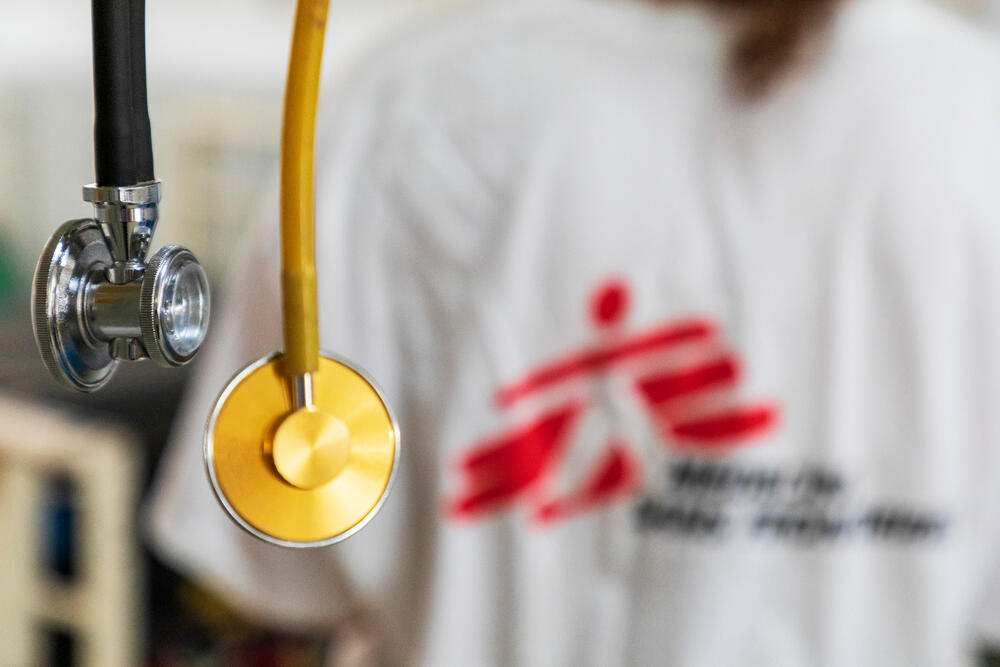MSF launches UK operations to treat people seeking asylum
Médecins Sans Frontières / Doctors without Borders (MSF) and Doctors of the World (DOTW) UK have begun providing primary healthcare to men seeking asylum who are being held in a large-scale containment site in the former military barracks at Wethersfield in Essex.
This is the first time MSF has opened a project working with people seeking sanctuary in the UK.
MSF and DOTW have been assessing the physical and mental health needs of the residents at RAF Wethersfield since early September.
Whilst there is a medical centre providing primary healthcare onsite, the men we’ve spoken to tell us their specific health needs are not being met for various reasons.
We are worried about the men’s living conditions and how this will negatively impact their health and dignity.
Explainer: Why is MSF treating people seeking asylum in the UK?
Mental health concerns
RAF Wethersfield is an extremely remote site, miles from any big town and cut off from community. It is heavily surveilled with CCTV and security guards, surrounded by chain link fence and barbed wire. The site is perceived as a prison by the population.
The men we’ve spoken with have told us they feel isolated and alone and that their mental health has worsened since they have arrived at the former military base.
“We know from our work around the world that harsh deterrence policies, such as holding people seeking sanctuary in mass containment sites, is a recipe for disaster which ultimately costs lives"
We anticipate the men’s mental health will deteriorate as time goes on with asylum claims in limbo since the Illegal Migration Act became law and as the number of men contained in the barracks increases.
Whilst there are approximately 650 men currently in Wethersfield, the Home Office intends to increase the number to 1,700 by this year.
A dangerous approach
Since 2016, MSF has seen and treated the devastating medical and humanitarian consequences of holding thousands of people seeking asylum in large-scale containment sites on the Greek islands – a dangerous approach the Home Office is openly emulating.
“We know from our work around the world that harsh deterrence policies, such as holding people seeking sanctuary in mass containment sites, is a recipe for disaster which ultimately costs lives. This has sadly come to pass on Bibby Stockholm," said Dr Javid Abdelmoneim, who has been running the project at the site.
"Many of the men held in Wethersfield will likely have experienced violence, war, arbitrary detention and other trauma and will require tailored and specialised healthcare. Everyone who reaches the UK in search of sanctuary needs safe and dignified accommodation in the community, not in isolated military barracks.
“MSF is committed to providing medical and humanitarian care to people seeking safety in the UK contained in large-scale sites whilst we see a need.”
Simon Tyler, Doctors of the World UK Executive Director, said:
“A consequence of the broken asylum system is that we are now seeing people forced into containment sites that operate like open prisons. These camps are not a sustainable solution for anyone there stuck in limbo, or the local communities.
"But an efficient and safe process can exist to allow people to rebuild, be active, and look after their own health. Our medical team on the ground is supporting those affected access medical care as needed, with the welcomed collaboration of MSF.”
MSF and DOTW will continue this project this year.
MSF, refugees and displaced people
An unprecedented 108.4 million people around the world have been forced from their homes, according to UNHCR.
The reasons vary, but violence and conflict; natural disasters; or extreme weather events can all mean that it is no longer safe to stay where you are.
